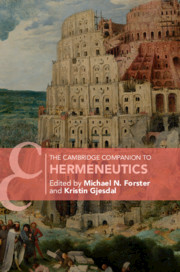Book contents
- The Cambridge Companion to Hermeneutics
- Other Volumes in the Series of Cambridge Companions
- The Cambridge Companion to Hermeneutics
- Copyright page
- Contents
- Contributors
- Acknowledgments
- Introduction
- 1 Hermeneutics and Theology
- 2 Hermeneutics and Nature
- 3 Hermeneutics and Romanticism
- 4 Hermeneutics and German Idealism
- 5 Hermeneutics and History
- 6 Hermeneutics and Positivism
- 7 Hermeneutics
- 8 Hermeneutics and Psychoanalysis
- 9 Hermeneutics and Phenomenology
- 10 Hermeneutics and Critical Theory
- 11 Hermeneutics
- 12 Hermeneutics
- 13 Hermeneutics and Literature
- 14 Hermeneutics and Law
- 15 Hermeneutics and the Human Sciences
- Bibliography
- Index
- Other Volumes in the Series of Cambridge Companions
10 - Hermeneutics and Critical Theory
Published online by Cambridge University Press: 27 December 2018
- The Cambridge Companion to Hermeneutics
- Other Volumes in the Series of Cambridge Companions
- The Cambridge Companion to Hermeneutics
- Copyright page
- Contents
- Contributors
- Acknowledgments
- Introduction
- 1 Hermeneutics and Theology
- 2 Hermeneutics and Nature
- 3 Hermeneutics and Romanticism
- 4 Hermeneutics and German Idealism
- 5 Hermeneutics and History
- 6 Hermeneutics and Positivism
- 7 Hermeneutics
- 8 Hermeneutics and Psychoanalysis
- 9 Hermeneutics and Phenomenology
- 10 Hermeneutics and Critical Theory
- 11 Hermeneutics
- 12 Hermeneutics
- 13 Hermeneutics and Literature
- 14 Hermeneutics and Law
- 15 Hermeneutics and the Human Sciences
- Bibliography
- Index
- Other Volumes in the Series of Cambridge Companions
Summary
- Type
- Chapter
- Information
- The Cambridge Companion to Hermeneutics , pp. 237 - 259Publisher: Cambridge University PressPrint publication year: 2019
- 1
- Cited by



